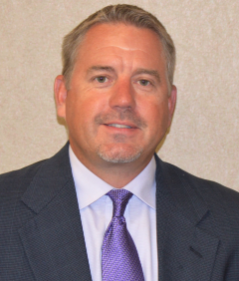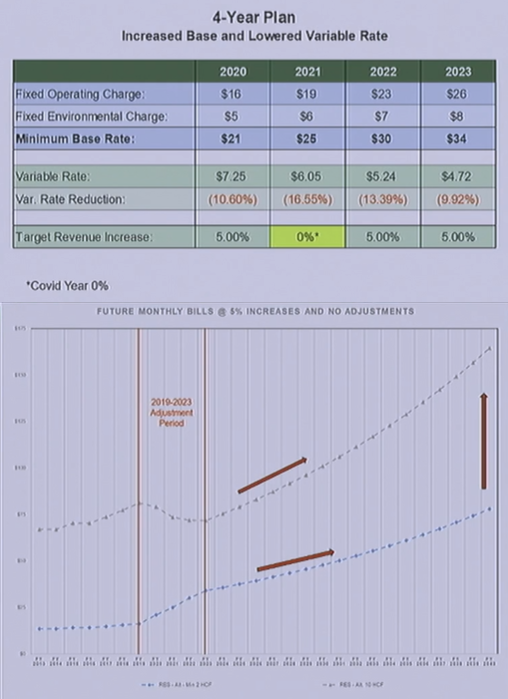By Patricia A. Scheyer
NKyTribune reporter
SD-1 Executive Director Adam Chaney came to the regular Boone County Fiscal Court meeting this week to explain the adjustments he had to make at SD-1 to make the agency fiscally soluble and have rate increases that make sense for the long term.
“I’m here to talk about Sanitary sewer rates, to talk to you about where we were, where we are, and about where we’re headed with our rate structure,” he told commissioners. “We will end with — when we talk about rates and the funding — its always good to also share where those funds are being reinvested in the community.”

Adam Chaney
Four years ago, Chaney came to the court to propose a rate restructure to deal with serious problems that he ascertained in the organization.
He listed some of the problems. Prior to the rate restructure, water consumption had declined 1.06 percent annually for the last five years.
That situation had created the need to increase rates each year by the amount of decline just to stay revenue neutral. A remedial base rate structure was needed to mitigate the continuous rate increases required to offset the consumption decline. Chaney confirmed that a lot of the decline is due to more water efficient appliances and shower heads. The decline could continue.
Also, prior to the restructure, 100 percent of SD-1’s revenues were variable, and based on water consumption.
But they found that the rate structure did not adequately align with the cost of providing service. The sustained decline in water consumption created a significant threat to long term revenues. Not only did rate inequity exist between residential customer classes, but the rate structure was not in line with peer utilities, such as Columbus, Cincinnati, St Louis, Louisville, and Indianapolis.
“This was the plan that we created over the course of 4 years from 2020 to 2023,” he said. “We increased our base rate from $21 to $34, and we simultaneously lowered our variable rate from $7.25 to $4.72. We had always targeted a revenue increase of 5 percent, and while some were going up, others were going down, but the net effect is that we were targeting a 5 percent revenue increase. If you notice, in 2021 we didn’t take that increase, and that was because that was the COVID year.”
Chaney laid out the future goals for rate setting. He told commissioners that they want to meet all the required obligations of the Clean2040 federal program as quickly and efficiently as possible, with no more than a 5 percent revenue year-over-year.
He wants to maintain customer class equity by matching rate structure to the costs of providing service. He said he also wants to protect the economic vitality of the community by keeping the NKY sewer rates competitive with the peer utilities in the region.
He showed a slide that depicted the separation of lines if they didn’t make annual adjustments, and said the rates would trend upward to $175 monthly on the high end.
The next slide showed an orange line where they want the average bill to stay, with $125 on the top tier and $50 on the low end. Chaney said this is what they feel is an appropriate range for the future.
Chaney stated that the same guardrails that were put in place four years ago when they unveiled this rate structure program would stay in place for now.
This includes that no rate structure proposal will increase budgeted revenues by more than 5 percent year over year, the minimum charge for base and environmental rates will not be raised by more than $5 per month for any residential class, the customer assistance program will remain in place for the low income customers, and the environmental surcharge will go away after the completion of the Clean2040 capital program. This will affect the rates for the next four years, 2024 through 2027.
“We still have some work to do,” Chaney said. “We have to continue to look at this annually and make adjustments.”
Commissioners voted 4-0 to approve the adjustments to SD-1 sanitation sewer rates to limit projected budgeted revenue to no more than 5 percent over the previous fiscal year for the next four fiscal years. However, Commissioner Chet Hand made an amendment to change the fifth ‘whereas’ in the contract to say that back in 2019 Boone County did not agree to the project, but Campbell and Kenton counties did agree.
The only objection all three commissioners were concerned with was representation on the SD-1 board. Judge Executive Gary Moore said that was an issue with KRS 220, and that state law had to be amended to fix the representation to the board.
“The turnaround at SD-1 has been remarkable, and it is clearly due to Adam’s leadership and the team that he has built there,” said Judge Executive Gary Moore, praising Chaney’s extensive financial knowledge. “We might not like the numbers, but the numbers are the numbers, and the data is the data.”

















